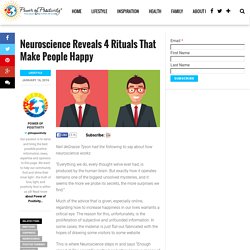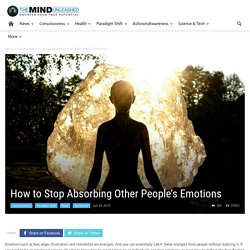

Self-Care Ideas for a Bad Day. I think that, for most of us, there are times in life when it all just feel like Too Much.

There may be some days, weeks, months, maybe even years when – for whatever reason – just getting through the day, or going to work, or putting one foot in front of the other feels hard. Really, really hard. Maybe it’s because you’re wrestling with anxiety, depression or some other mental illness. Maybe it’s because you’ve had your heart broken. Why Is Gratitude So Difficult, Yet Outrage So Easy? Our brains are at odds with the concept of Thanksgiving.

Gratitude should be the order of the day (and every day if you subscribe to the notion that giving thanks daily can make you happier), yet we are much more likely to be outraged by traffic delays, rude people, and a barrage of headlines blaring the latest bad news. “Part of the reason we are so quick to be outraged, yet slow to offer gratitude at work and in life, more broadly, is because of the widespread finding that human beings possess a negativity bias,” says Christian Thoroughgood, assistant professor of psychology at Villanova University. He says that even when they’re of equal intensity, negative events and experiences have a much more potent effect on our thoughts, emotions, and behavior than do neutral or positive events and experiences.
The reason lies deep within our brain and hasn’t evolved much past the point when we were hunter-gatherers. Related: The Surprising Benefits Of Gratitude This begets a virtuous cycle. Luck Is a Bigger Contributor to Success Than People Give It Credit For. I’m a lucky man.

Perhaps the most extreme example of my considerable good fortune occurred one chilly Ithaca morning in November 2007, while I was playing tennis with my longtime friend and collaborator, the Cornell psychologist Tom Gilovich. He later told me that early in the second set, I complained of feeling nauseated. The next thing he knew, I was lying motionless on the court. He yelled for someone to call 911, and then started pounding on my chest—something he’d seen many times in movies but had never been trained to do. He got a cough out of me, but seconds later I was again motionless with no pulse. Ithaca’s ambulances are dispatched from the other side of town, more than five miles away. Doctors later told me that I’d suffered an episode of sudden cardiac arrest.
If that ambulance hadn’t happened to have been nearby, I would be dead. Not all random events lead to favorable outcomes, of course. My having cheated death does not make me an authority on luck. Neuroscience Reveals 4 Rituals That Make People Happy. Neuroscience Reveals 4 Rituals That Make People Happy Neil deGrasse Tyson had the following to say about how neuroscience works: “Everything we do, every thought we’ve ever had, is produced by the human brain.

But exactly how it operates remains one of the biggest unsolved mysteries, and it seems the more we probe its secrets, the more surprises we find.” Much of the advice that is given, especially online, regarding how to increase happiness in our lives warrants a critical eye. The reason for this, unfortunately, is the proliferation of subjective and unfounded information. This is where Neuroscience steps in and says “Enough already!” Now, neuroscience – the scientific study of the structure and function of the nervous system and brain – has brought forth findings proving that increasing our happiness is within our cognitive control. Truthfully, this should not come as a surprise.
There are not many things more exciting than discovering the immense power and energy within our bodies.
11 Ways to Live a Happier Life, According to a Psychologist (Hint: These have nothing to do with money!) Happiness is something that we all strive for, yet many of us find it challenging to grasp and even harder to maintain.

How to Stop Absorbing Other People’s Emotions. Emotions such as fear, anger, frustration, and immobility are energies.

And you can potentially ‘catch’ these energies from people without realizing it. If you tend to be an emotional sponge, it’s vital to know how to avoid taking on an individual’s negative emotions, or even how to deflect the free-floating negativities in crowds. Another twist is that chronic anxiety, depression, or stress can turn you into an emotional sponge by wearing down your defenses. Suddenly, you become hyper-attuned to others, especially suffering with similar pain.
That’s how empathy works; we zero in on hot-button issues that are unresolved in ourselves. From an energetic standpoint, negative emotions can originate from several sources: what you’re feeling may be your own; it may be someone else’s; or it may be a combination. Stop Absorbing Other People’s Emotions 1. People call you “hyper-sensitive”, “overly sensitive”, etc., and they don’t mean it as a compliment!
2. 3. 4. 5. 6. 7. 8. 9. About the Author. We Deserve 5 Minutes of Bliss {Gorgeous Video} “Everybody needs beauty as well as bread, places to play in and pray in, where nature may heal and give strength to body and soul alike.”~ John Muir, The Yosemite (1912) Yosemite is one of our most precious National Parks.

If you have never been there, you can go there this very minute in ways that you might not even be able to experience if you were actually there! This breathtaking five minute film took me of out my head and put me into a healing, meditative, heaven-like realm—seriously.